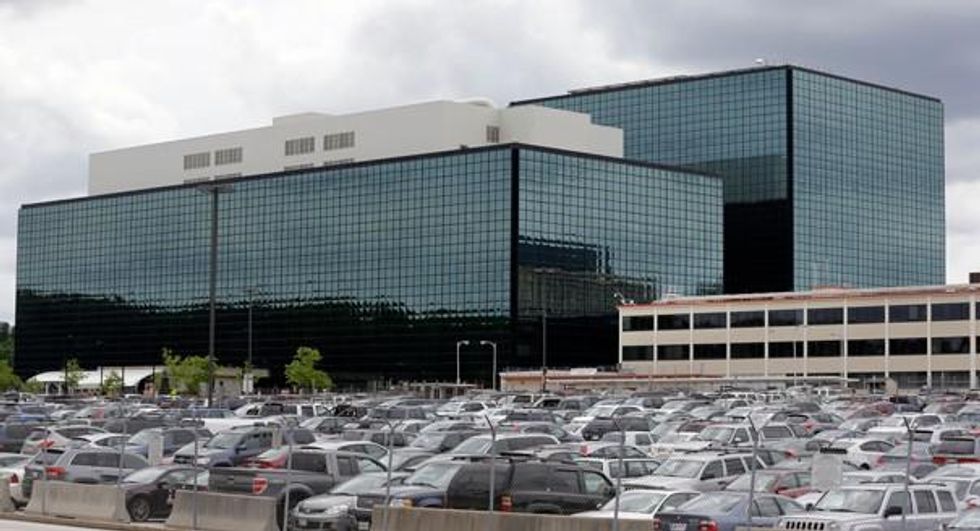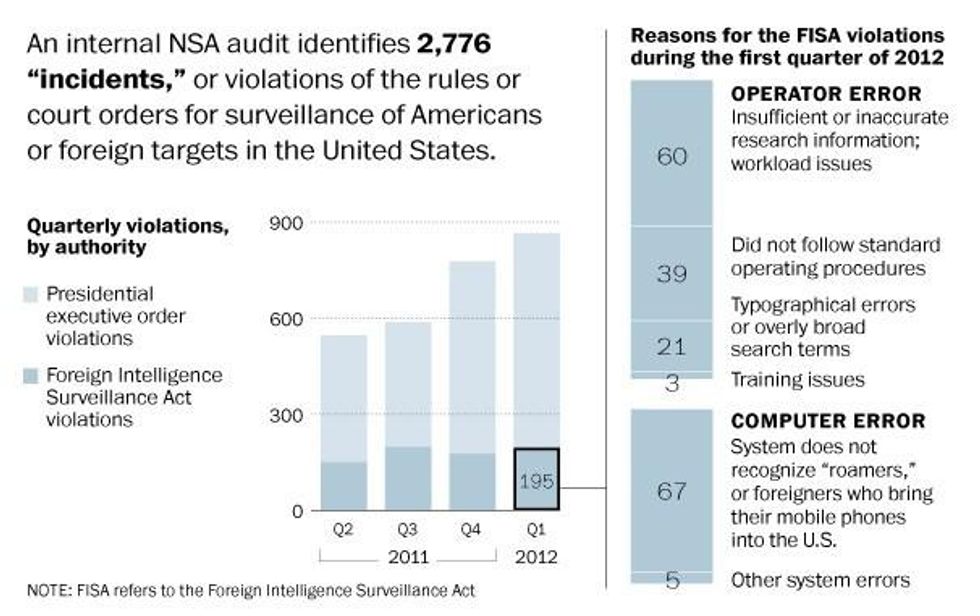An internal National Intelligence Agency audit and other documents leaked to the
Washington Post by whistleblower
Edward Snowden show that despite official claims to the contrary, the spy agency broke its own guidelines, breaking "privacy rules" and overstepping "its legal authority" thousands of times each year as it collected online and phone data on Americans without a warrant or due process.
As the Post's Barton Gellman reports:
Most of the infractions involve unauthorized surveillance of Americans or foreign intelligence targets in the United States, both of which are restricted by statute and executive order. They range from significant violations of law to typographical errors that resulted in unintended interception of U.S. e-mails and telephone calls.
The documents, provided earlier this summer to The Washington Post by former NSA contractor Edward Snowden, include a level of detail and analysis that is not routinely shared with Congress or the special court that oversees surveillance. In one of the documents, agency personnel are instructed to remove details and substitute more generic language in reports to the Justice Department and the Office of the Director of National Intelligence.
In one instance, the NSA decided that it need not report the unintended surveillance of Americans. A notable example in 2008 was the interception of a "large number" of calls placed from Washington when a programming error confused the U.S. area code 202 for 20, the international dialing code for Egypt, according to a "quality assurance" review that was not distributed to the NSA's oversight staff.
In another case, the Foreign Intelligence Surveillance Court, which has authority over some NSA operations, did not learn about a new collection method until it had been in operation for many months. The court ruled it unconstitutional.
Jameel Jaffer, deputy legal director for the ACLU, called the scale of the violations "jaw-droppping."
"The rules around government surveillance are so permissive that it is difficult to comprehend how the intelligence community could possibly have managed to violate them so often," said Jaffer in a statement. "Obviously it's important to know what precisely these compliance incidents involved, and some are more troubling than others. But at least some of these incidents seem to have implicated the privacy of thousands or millions of innocent people."
One aspect that the ACLU finds particularly worrying is the degree to which the FISA Court, designed to oversee these surveillance programs, is at the mercy of the spy agency itself when it comes to garnering information.
"That the FISA court is so reliant on the representations of intelligence officials is a real problem. In recent months, intelligence officials have made misleading and even false statements about the government's surveillance activities," Jaffer said. "It makes no sense at all to let the intelligence community police itself."
In addition to foreign news outlets, including the UK's Guardian, Germany's Der Speigel, and Brazil's O Globo--the Washington Post has been the only large US news outlet given access to the trove of NSA documents obtained by Snowden.
The latest revelations only deepen the tension generated by public statements made by government officials and the contents of classified documents regarding the NSA's surveillance apparatus.
One important thing about the NSA audit revealed by the post, tweeted the Guardian's Glenn Greenwald, is that "the reports are internal, NSA audits, which means high likelihood of both under-counting & white-washing."
Among those seemingly unaware of the the number of annual violations by the NSA was chair of the Senate Intelligence Committee Sen. Diane Feinstein (D-CA), who only became aware of the internal report when asked about it by Gellman at the Post. In numerous public statements, Feinstein has sought to defend the NSA's record and practices.
This graphic shows a breakdown of the NSA violations by number and type:
According to the Post:
In what appears to be one of the most serious violations, the NSA diverted large volumes of international data passing through fiber-optic cables in the United States into a repository where the material could be stored temporarily for processing and selection.
The operation to obtain what the agency called "multiple communications transactions" collected and commingled U.S. and foreign e-mails, according to an article in SSO News, a top-secret internal newsletter of the NSA's Special Source Operations unit. NSA lawyers told the court that the agency could not practicably filter out the communications of Americans.
In October 2011, months after the program got underway, the Foreign Intelligence Surveillance Court ruled that the collection effort was unconstitutional. The court said that the methods used were "deficient on statutory and constitutional grounds," according to a top-secret summary of the opinion, and it ordered the NSA to comply with standard privacy protections or stop the program.
James R. Clapper Jr., the director of national intelligence, has acknowledged that the court found the NSA in breach of the Fourth Amendment, which prohibits unreasonable searches and seizures, but the Obama administration has fought a Freedom of Information lawsuit that seeks the opinion.
In another interesting twist related to the Washington Post's reporting on the NSA, an on-the-record interview conducted by Gellman was later targeted for retraction by the White House, who demanded that the reporter substitute a prepared statement instead. The Post refused and Gellman cataloged the events in a series of tweets:
He also posted the White House statements and an explanation here.
_________________________________________________





